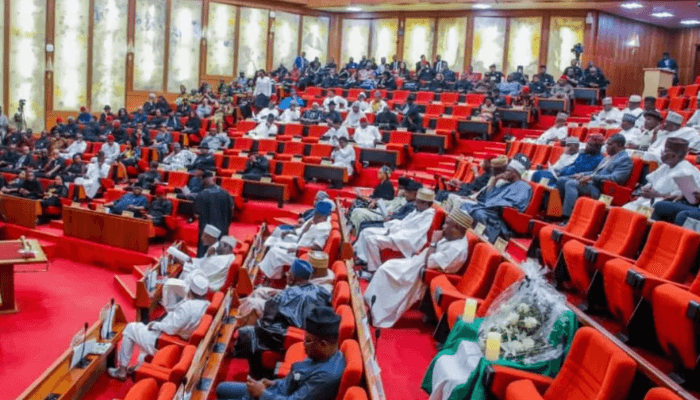Senate passes bill seeking to replace petrol-powered vehicles with electric cars
The Nigerian Senate on Wednesday passed for second reading the Electric Vehicle Transition and Green Mobility Bill, 2025, sponsored by Orji Kalu (Abia North).
The Bill seeks to establish a national framework for transitioning to electric vehicles, promote local manufacturing, ensure environmental sustainability, and position Nigeria as a leader in clean transportation across Africa.
The proposed legislation, which was extensively debated on the Senate floor, outlines detailed strategies for achieving electric mobility through local content promotion, foreign partnership regulations, a nationwide charging network, and coordinated inter-ministerial collaboration.
Leading the debate, Kalu said the Bill aims to transform Nigeria’s automobile and energy sectors by driving innovation, local assembly, and environmental protection while generating thousands of jobs across the manufacturing value chain.
“This Bill will help Nigeria move from dependence on fossil fuels toward a cleaner and sustainable energy system.
“It will ensure that our local industries benefit directly from the emerging global electric vehicle market, create jobs, and reduce emissions in our cities,” Kalu stated.
He explained that the Bill provides incentives such as tax holidays, import duty waivers, toll exemptions, subsidies, and road tax reliefs for electric vehicle users and investors. It also mandates the installation of charging points at all fuel stations across the country.
A key highlight of the Bill is its emphasis on local content compliance.
It requires all foreign automakers operating in Nigeria to partner with licensed local assemblers and establish assembly plants within three years. By 2030, such firms must source at least 30 percent of components locally.
Failure to comply will attract stiff penalties, including operational suspension and fines of ₦250 million per violation.
Unlicensed importers or dealers face ₦500 million fines per shipment and confiscation of goods.
The Bill further prohibits unauthorised research or innovation partnerships, ensuring that all government-funded EV research is conducted through approved Nigerian institutions.
“We are creating a system that protects Nigerian industries and ensures that technology transfer and innovation happen locally,” Kalu said.
The proposed law also sets up a comprehensive institutional framework coordinated by the Federal Ministry of Industry, Trade, and Investment, with support from key agencies including the Standards Organisation of Nigeria (SON), the Federal Ministry of Transportation, the Federal Ministry of Power, the Federal Inland Revenue Service (FIRS), and the Federal Ministry of Environment.
Each agency will play a defined role in developing safety standards, overseeing infrastructure, integrating renewable energy, managing tax incentives, and ensuring compliance with environmental obligations.
Senator Adamu Aliero (Kebbi Central) emphasized the urgency of cutting carbon emissions in major cities.
“The world is moving forward, and cities like Lagos and Kano are already suffering from high carbon emissions.
“Electric vehicles will drastically cut down pollution, improve public health, and create a new industrial ecosystem for Nigeria.
“Instead of exporting lithium, we should process and utilise it here at home to create jobs and diversify our economy,” Aliero said.
Supporting the motion, Senator Osita Ngwu (Enugu West) highlighted the Bill’s role in combating climate change.
“Climate change is already affecting our communities and agricultural productivity.
“Embracing clean mobility is part of our national responsibility to future generations,” he stated.
Senator Titus Zam (Benue North-West) added that Nigeria must not fall behind as other nations accelerate electric mobility adoption. “From Europe to Asia and even several African countries, the electric vehicle revolution has already taken shape.
“Nigeria must not be left behind if we hope to remain competitive and relevant,” Zam said.
Read also: Senate uncovers $303bn crude oil diversion under NNPC’s DSDP scheme
Beyond its environmental goals, the Bill seeks to stimulate industrial growth by encouraging large-scale EV production and integrating Nigeria into the global value chain. Clause 3 mandates that local assemblers must have a minimum annual production capacity of 5,000 units and comply with global safety standards. Private investors establishing charging stations will qualify for tax credits and government grants.
After robust deliberation, the Bill was put to a voice vote and passed for second reading under the gavel of Senate President Godswill Akpabio.
Akpabio praised Kalu’s initiative, describing the Bill as a strategic step aligned with President Bola Tinubu’s diversification agenda and global clean energy trends.
“This Bill represents an important step toward sustainable industrial growth and environmental responsibility. Nigeria must prepare for the future of transportation and energy,” Akpabio said.
The Bill was referred to the Senate Committee on Industry for further legislative work and is expected to return to the chamber within four weeks.

